Photo: Stephen Tayo
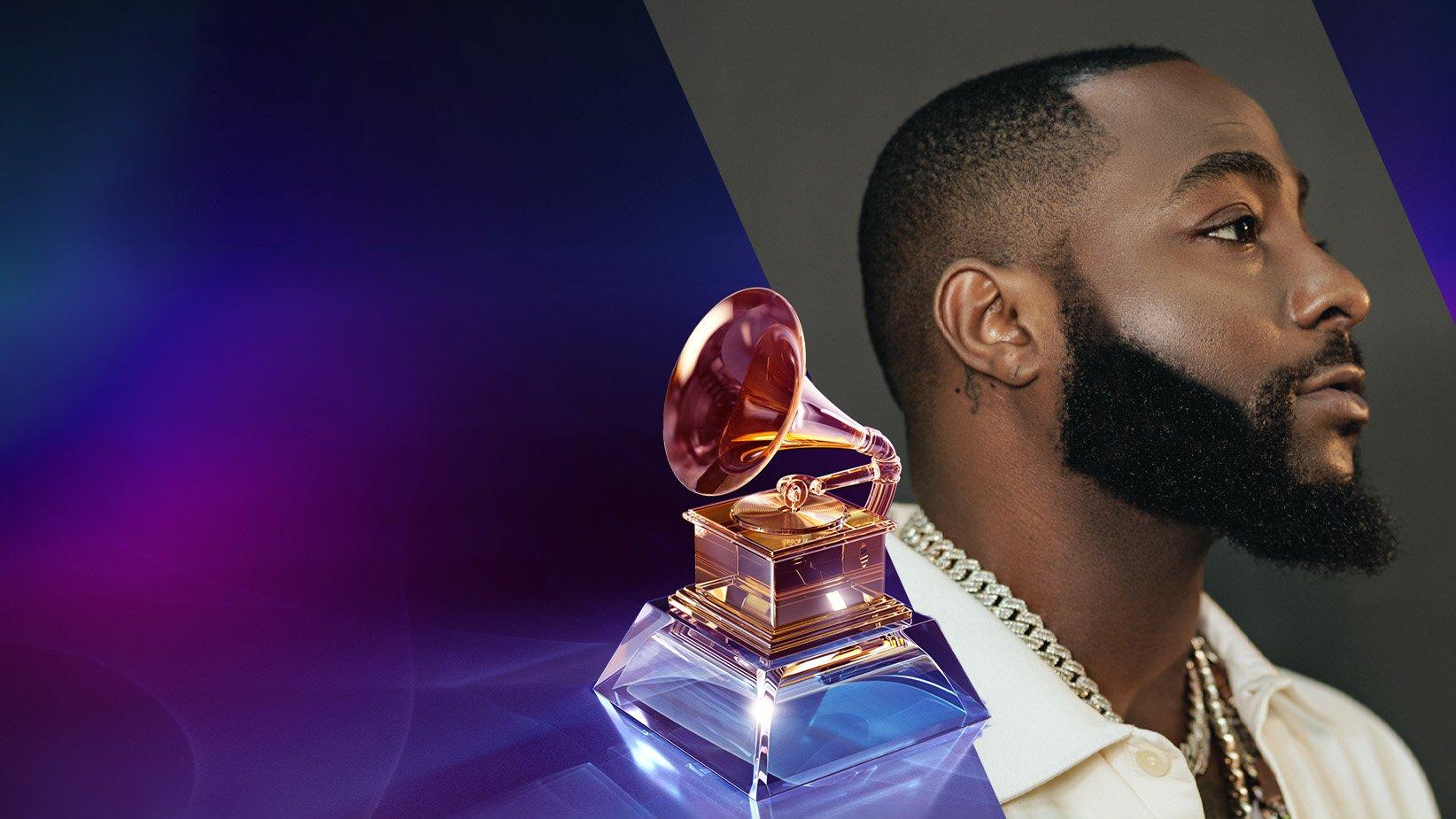
interview
Meet The First-Time Nominee: Davido On The Rise Of African Music & Making 'Timeless' Songs
A standard-bearer of Afrobeats, Davido celebrates three nominations at the 2024 GRAMMYs: Best Global Music Performance, Best Global Music Album and Best African Music Performance — the latter of which helped him become part of history.
Davido has dedicated his life to his African roots. From paying tribute to the Yoruba people on his debut album, 2012's Omo Baba Olowo, to hosting the inaugural A.W.A.Y Festival last November, the Nigerian-American singer/songwriter/producer's pride is undeniable.
That's part of what makes Davido's first-ever GRAMMY nominations so special. Not only is he nominated for three golden gramphones at the 2024 GRAMMYs, but he's nominated for the first-ever Category honoring African music.
Along with Davido, the Best African Music Performance Category features some of the continent's best and brightest talent, Ayra Starr, Tyla, Burna Boy, and ASAKE & Olamide. Perhaps unsurprisingly, Davido's nominated track is also his biggest to date: "UNAVAILABLE," his thumping hit with South African producer Musa Keys that reached No. 3 on the Billboard U.S. Afrobeats Songs chart in 2023.
"It feels incredible to be a part of history," Davido expresses to GRAMMY.com over email. "Hopefully there are more African categories added in the future."
For now, African music is also honored in the Best Global Music Album and Best Global Music Performance Categories — both of which feature Davido's work. His acclaimed fourth album, Timeless, is nominated in the former Category, while sultry album cut "FEEL" is in the latter.
With Burna Boy also nominated in both Categories, Afrobeats is the only genre to appear twice in each. It's a reflection of African genres' fiery ascent over the past few years. "It's been at a peak, reaching mainstream [attention] the past few years that I don't think it's ever been at before," Davido says of African music. "It's an amazing thing to witness and be a part of."
Timeless marked an important point in Davido's career, as it was his first album in nearly three years after releasing two back to back, 2019's A Good Time and 2020's A Better Time. While he says it's his most personal work to date, Davido wanted to make sure the final result was exactly what its title indicated.
"I wanted to go for something that would transcend the 'here and now' fads," he explains. "When people listen back to it 20 years later, I want it to hit the same as people listening to it now."
The three-year gap between albums helped foster that, as it allowed Davido to reset and recalibrate. "I think it gave me time to not only reconnect with my family, but to reconnect with myself too," he adds. "I think I needed that time to come back even better than before and do what I do best — spread joy through music."
That joy certainly permeated the sessions for Timeless, which contains both "FEEL" and "UNAVAILABLE." While he can't put his finger on it, he notes a "special" and "different" atmosphere to this music-making. "I just wanted to let go and have a good time with creating my music and how I was feeling," Davido says. "I think both those tracks encapsulate that."
Whether he takes home a golden gramophone on Feb. 4 or not, 2024 will be a banner year for Davido. Ahead of attending the GRAMMYs for the first time in his career, he played a sold-out show at London's O2 on Jan. 28, and he'll play Accor Arena in Paris on Jan. 31. He has three more arena dates on the books for April, including New York City's famed Madison Square Garden on April 17.
When it comes to other goals for the year, Davido's mood is ascendant — and he hopes to keep it that way. "Working on more new music, doing more shows and staying positive are my plans and goals for this year," Davido reveals.
As the rise of African music continues, Davido has proven that he'll strive to stay at the forefront. Wherever he takes his music from here, one thing is certain: he'll always make sure it's timeless.
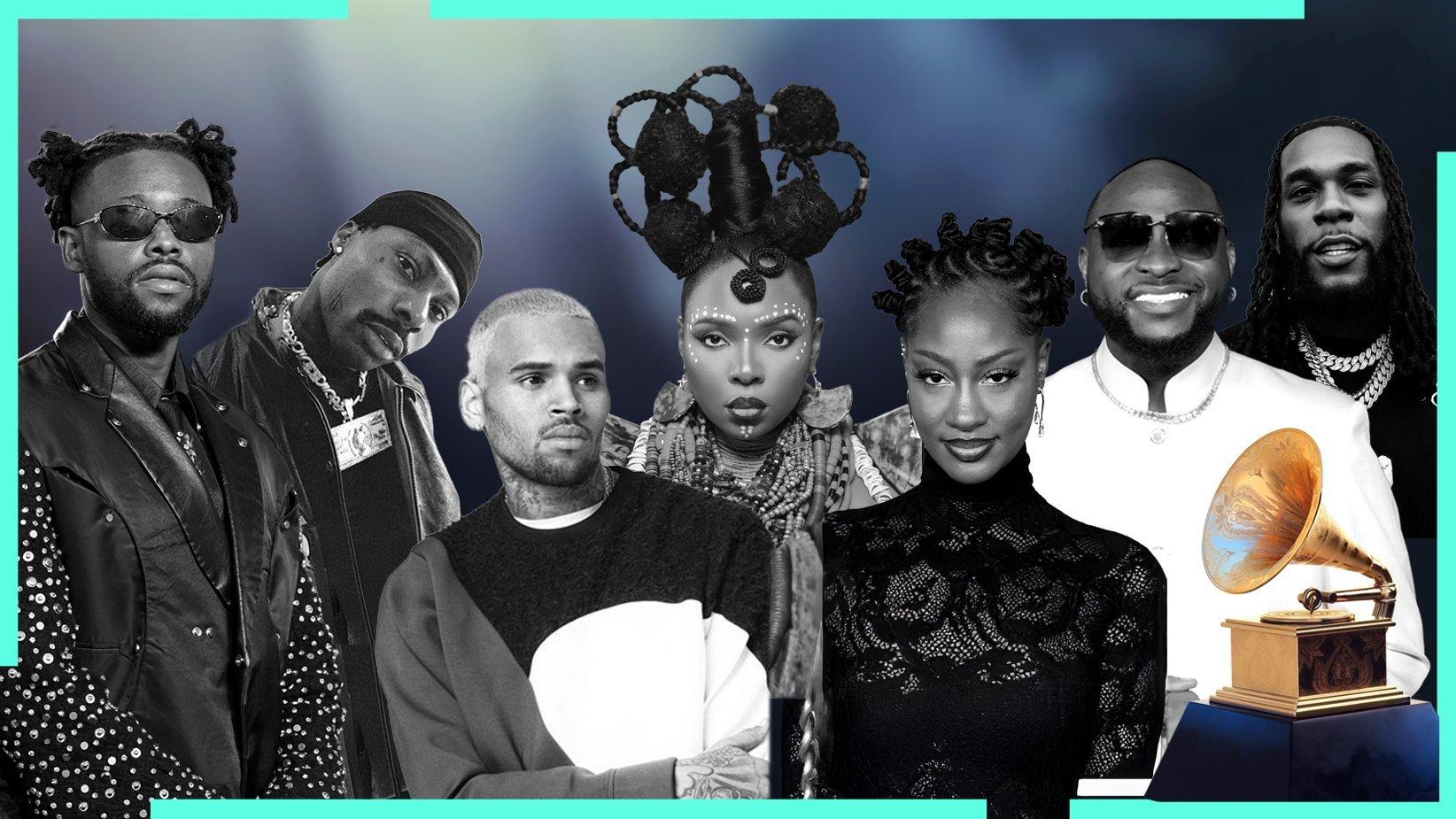
list
2025 GRAMMYs Nominations: Best African Music Performance Nominees
Burna Boy, Yemi Alade, Asake & Wizkid, Tems, and Chris Brown featuring Davido and Lojay are nominees in the second annual Category.
Earlier this year, the Recording Academy made history by awarding their first-ever GRAMMY Award for Best African Music Performance. Never before had the continent’s vibrant musical culture been given a category all their own, and the best and brightest from the African music industry stepped up to receive nominations.
The eventual victor was 22-year-old South African singer Tyla, whose bewitching song "Water" earned the hearts of GRAMMYs voters, as well as millions of listeners that boosted the song to the Billboard Hot 100. She became the first South African in 55 years to make the chart.
Read more: 10 African GRAMMY Winners Through The Years: From Miriam Makeba To Angélique Kidjo & Burna Boy
This year, Tyla will not defend her prize. But five fantastic songs from a multitude of artists, including one high-profile American that has joined up with two Afrobeats stars, will compete for the Golden Gramophone. Check out the nominees below and read the full 2025 GRAMMYs nominations list ahead of Music's Biggest Night on Sunday, Feb. 2, 2025.
Yemi Alade — "Tomorrow"
One of African pop music’ biggest stars, Yemi Alade would be a legend even without a GRAMMY nod. She first rose to fame a decade ago thanks to continental hits like "Johnny" and "Oh My Gosh" with Rick Ross. In July, she took her sound to new heights on Rebel Queen, an album incorporating genres such as highlife and dancehall for a global celebration of Black music that solidifies her reputation as "Mama Africa."
"Tomorrow," the GRAMMY-nominated song from the album, is a triumphant, bright amapiano tune, the latest result of Alade’s flirtation with the genre. Produced by Yasso and incorporating choral vocals, the lyrics in English and Nigerian Pidgin assert the singer’s unflappable confidence and self-belief. "I dance away my sorrow," she sings, "Rain or shine, I’ll be shining like a diamond."
"Tomorrow" marks the legendary artist’s first-ever GRAMMY nomination, but whether or not she grabs the golden gramophone, it’s clear from her song that nothing will phase this Rebel Queen.
Burna Boy — "Higher"
Burna Boy is such an undisputed force in African music, it’s not surprising for him to be nominated in this Category two years in a row. Already a GRAMMY winner for Best Global Music Album (Twice As Tall took the prize in 2021), his bold, American R&B-inspired "City Boys" earned a Best African Music Performance nod last year and was among a medley of tracks Burna performed on the GRAMMY stage. The braggadocious hip-hop song ultimately fell to Tyla’s "Water," however.
The success of his 2023 album I Told Them may have put Burna Boy in a more contemplative state of mind, because "Higher," his current nominated track, is a much more conscious effort. Over a mellow, amapiano-inspired beat from producer Yo Dibs, Burna reflects on his limited time on Earth and the harshness of daily life: "You know say streets don't love you rara / It's full of snakes and spiders / Make a wrong move, lose your life / Make it hard for your mother to sleep at night."
The song’s video, conceptually similar to Drake’s visual for "God’s Plan," shows the singer making an emotional visit to his hometown of Port Harcourt and distributing aid with his charity group Project PROTECT. It seems that magnanimity has already been rewarded: The song gained 1.3 million streams on Spotify in its first day of release, a new record for an African artist, and its video has been viewed over 7.3 million times as of this writing.
Chris Brown — "Sensational" feat. Davido & Lojay
It can’t be denied that Chris Brown is something of a survivor in the music industry. The GRAMMY winner for Best R&B Album (F.A.M.E.) is as famous for his hits — from "Run It!" and "Kiss Kiss," to "Look at Me Now" and "No Guidance" — as he is infamous for his checkered past.
Now he’s back in the GRAMMY spotlight with a single from his 2023 album 11:11. "Sensational" marks a bold stylistic pivot for the R&B singer as he adopts Afrobeats for a slick song that could be called, well, "breezy." Adding some African bona-fides, he’s recruited Davido — one of the genre’s most important acts and a GRAMMY nominee last year in this Category — as well as rising artist Lojay, for feature verses. The result is a transatlantic collab that makes the case that Americans can take on African genres too, with a little help from their continental friends.
Asake & Wizkid — "MMS"
In just a few short years, Asake has established himself as one of the most creative and charismatic new talents in Afrobeats. His 2023 record Work of Art blended the globally-aspirational Nigerian pop sound with South African house offshoot amapiano and the indigenous Yoruba genre fújì; Asake earned a GRAMMY nod in this category for album single "Amapiano" last year.
Asake isn’t one to rest on his laurels, however. He dropped another record, Lungu Boy, earlier in 2024, for which he switched up his sound further and recruited global stars like Stormzy, Central Cee, and Travis Scott. Single "MMS" keeps things refreshingly local in terms of guest spots, recruiting GRAMMY-winner Wizkid for the feature. Incorporating the same Yoruba-language choral vocals Asake used throughout his last album, he trades verses with Wiz over a glamorous, jazz-inflected, ‘90s R&B-inspired beat by P.Priime. The lyrics, in English, Yoruba, and Nigerian Pidgin, narrate Asake’s journey to finding his signature sound and letting fate determine his path. It’s a classy, reflective song from a pair of Africa’s biggest stars.
Tems — "Love Me JeJe"
Tems is already a GRAMMY winner and the first African artist to top the Billboard Hot 100, all thanks Future sampling her song "Higher" on his hit "Wait For U." Yet 2024 was the year in which the Nigerian artist stepped into her own spotlight, finally releasing her debut album Born in the Wild. Its single "Love Me JeJe" hit No. 1 on the UK Afrobeats charts and No. 3 on Billboard’s U.S. Afrobeats Songs.
Interpolating an identically-titled 1997 hit from Seyi Sodimu that’s regarded as an African pop classic, "Love Me JeJe" is an Afrobeats tune as tender as the Pidgin phrase that makes up its title. Tems’ smooth, heartfelt vocals float over the track as she sings of her desire for unconditional, supportive love: "I need your lovin’, so fresh, so clean / Love me in and out, unfailingly / And I’ll be down now, anytime you call me."
Debuting the song during her set at Coachella 2024, it could be argued that "Love Me JeJe" was meant to provide American audiences with a bridge to African music, from its past icons to its present talents. With her GRAMMY nod for the song, it seems that Tems has done just that.
More News About African Music
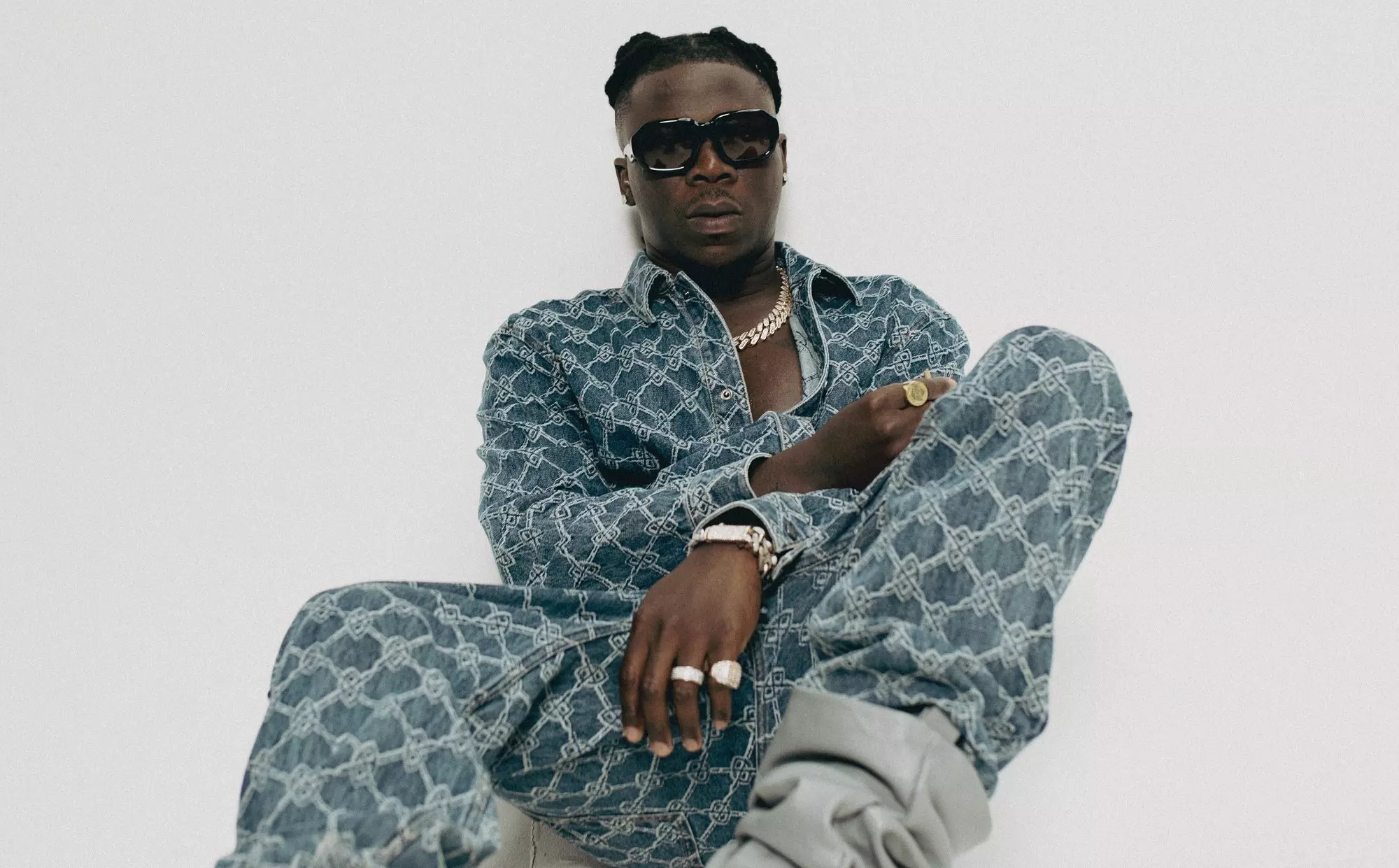
Stonebwoy On His "Inner Quest" To Showcase Authentic Ghanaian Sound

Mic Monsta Performs "Local Lokito" | Global Spin
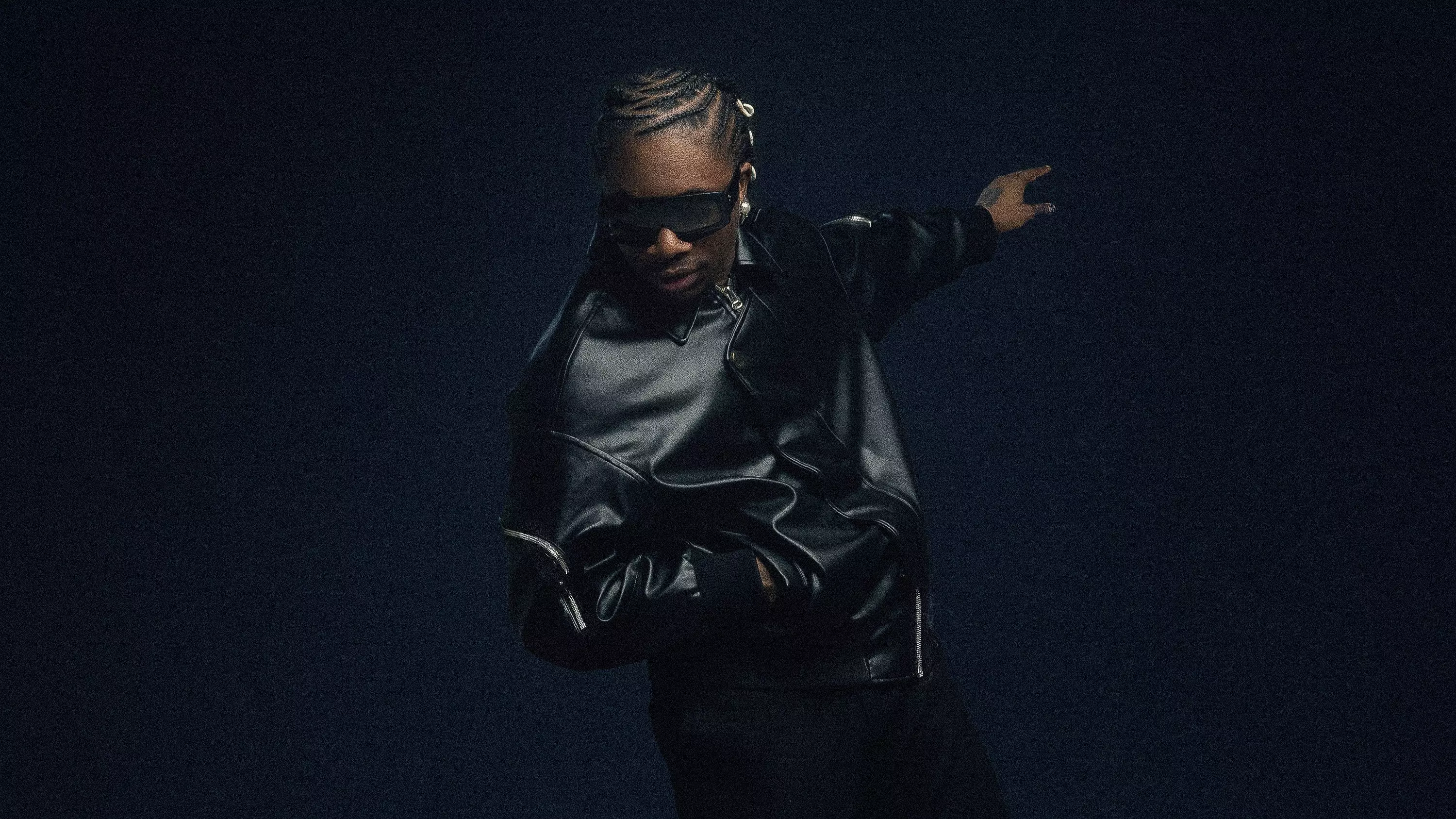
Rising Afrobeats Star Oxlade Is Ready To Go Global On 'Oxlade From Africa'
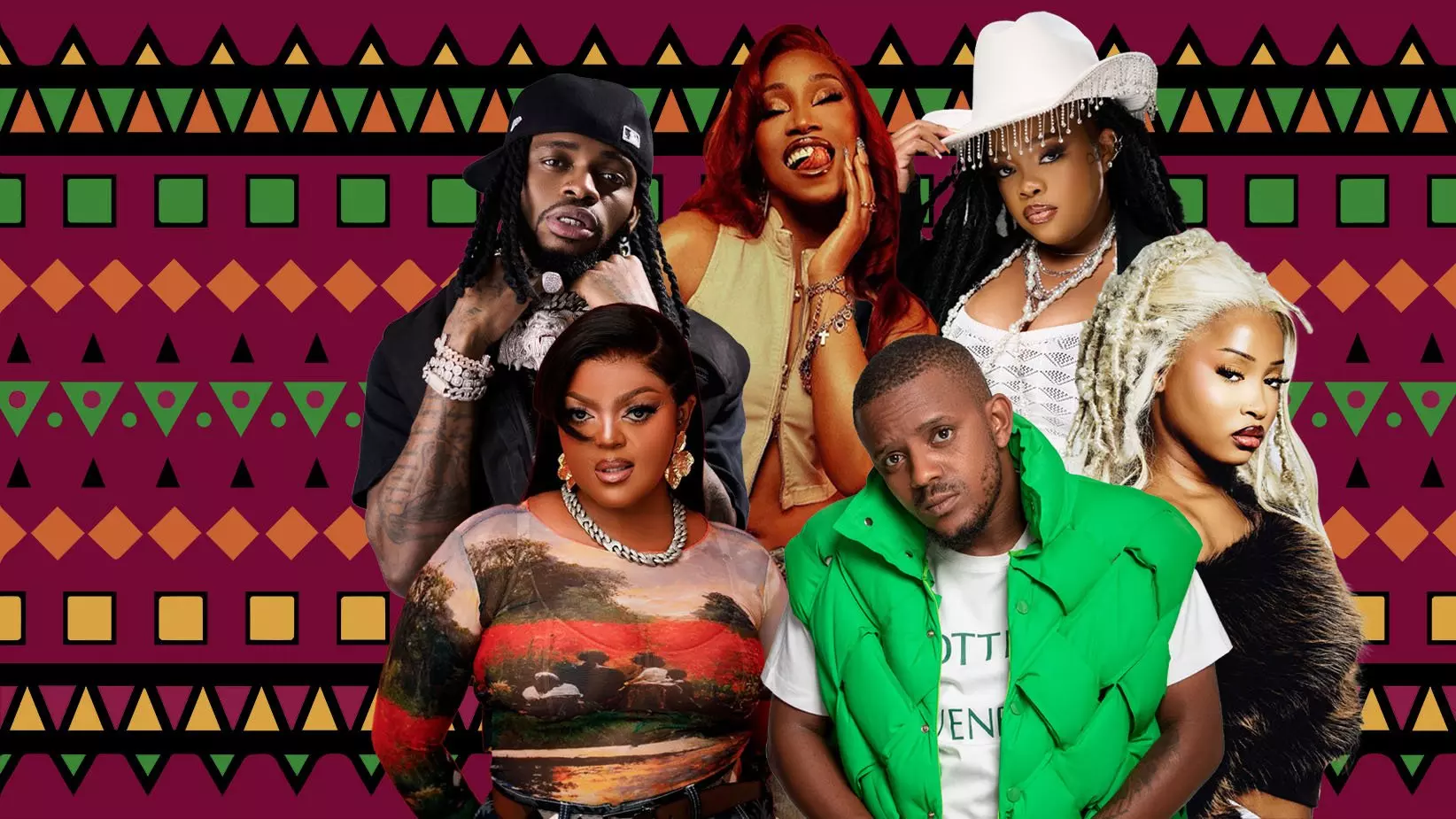
Amapiano's Decade-Long Journey To Global Dominance: The Sound Redefining Club Music Worldwide
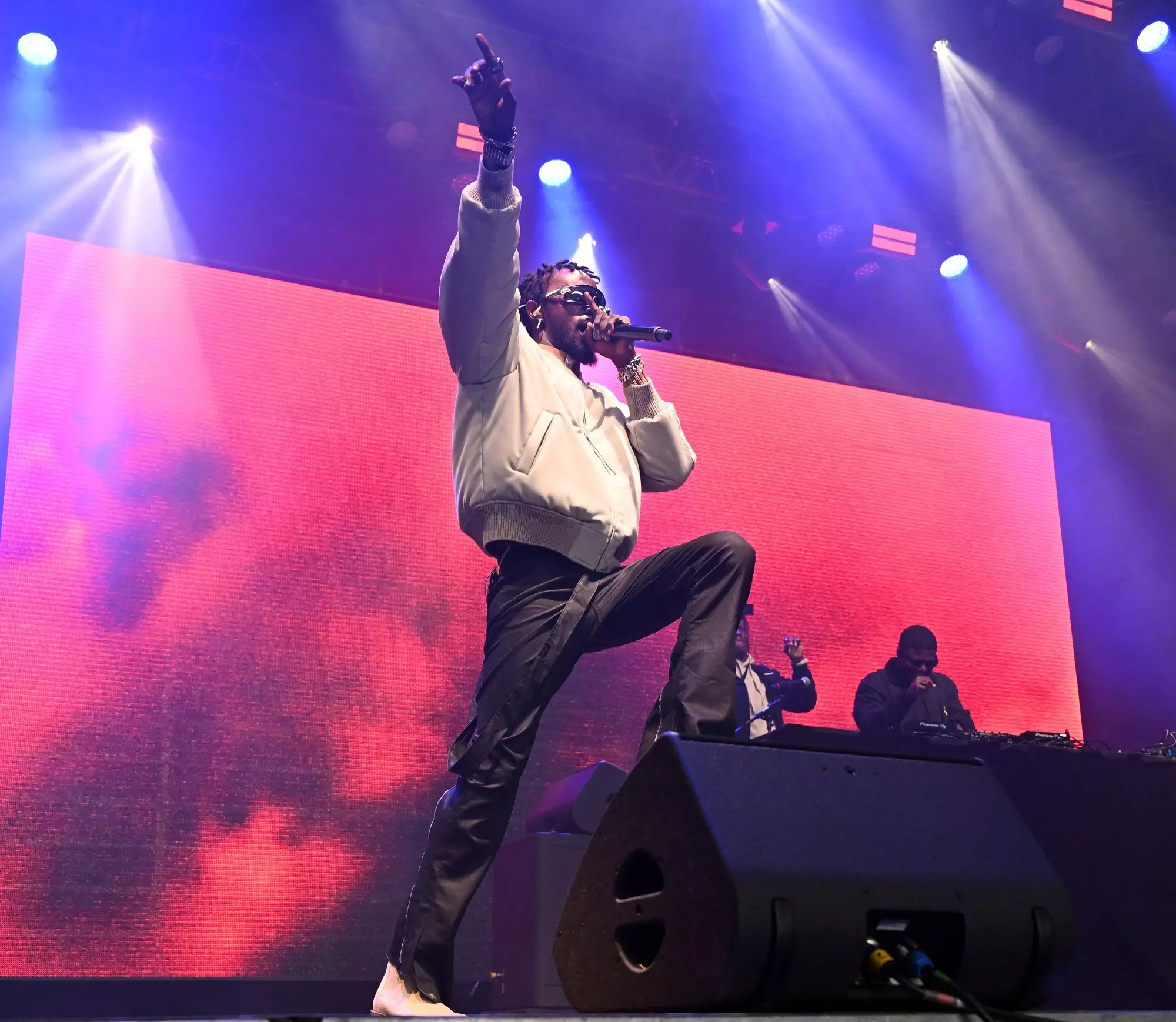
10 Artists Essential To Ghanaian Hiplife: Reggie Rockstone, Sarkodie, Mzbel & More
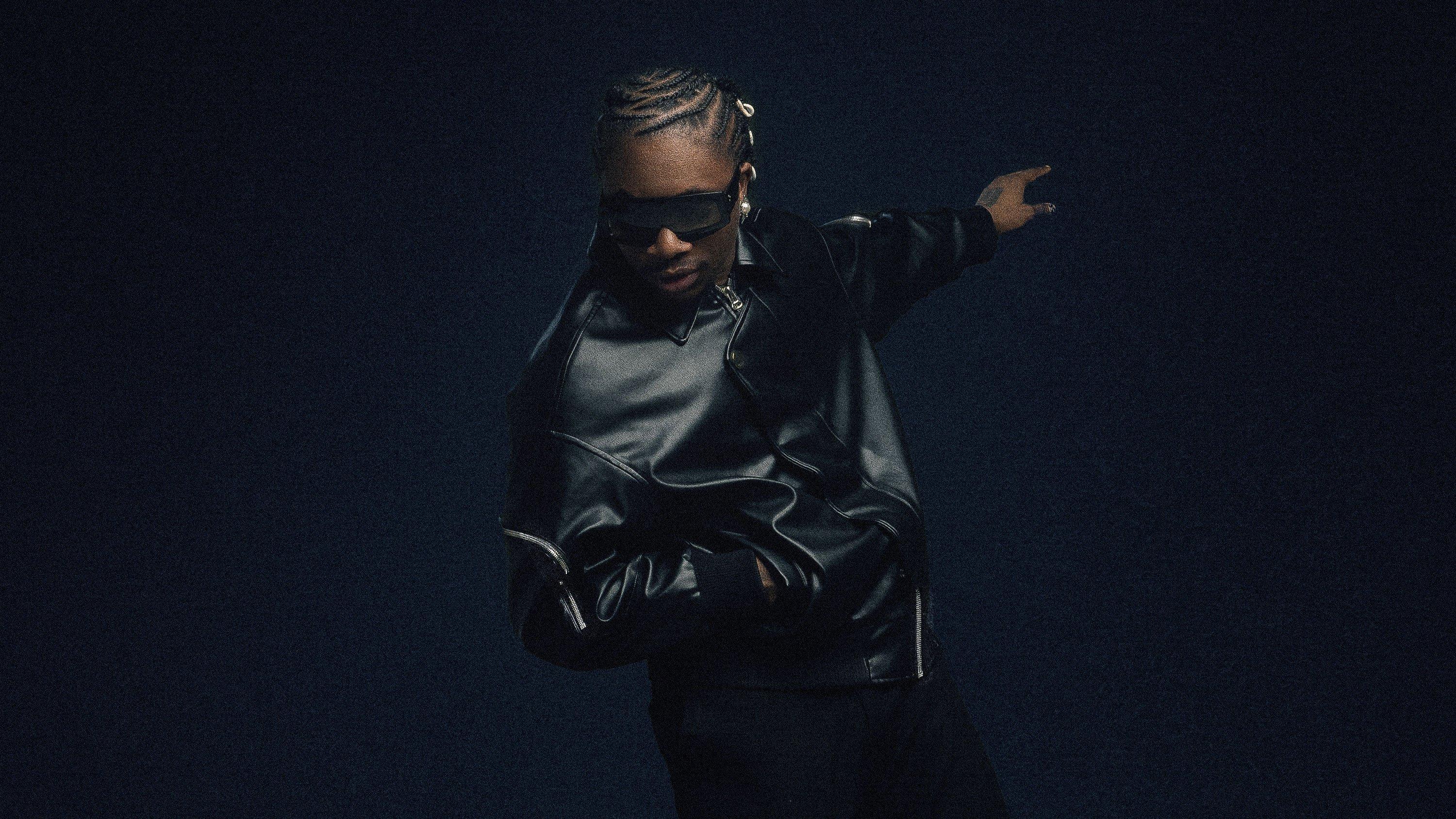
Photo: Courtesy of the artist
interview
Rising Afrobeats Star Oxlade Is Ready To Go Global On 'Oxlade From Africa'
The Nigerian singer discusses his new project, his global ambitions, and the unity of Afrobeats as an identity.
If there’s one thing Nigerian singer Oxlade believes in, it’s the power of Afrobeats as a world-conquering musical movement.
“Afrobeat is beyond the music. Afrobeats is who we are,” he says. “Afrobeats is the trends, the fashion, what we eat. Afrobeats is an identity.”
The Lagos native, born Ikuforiji Olaitan Abdulrahman, has good reason to believe in Afrobeats, considering he’s one of its fastest-rising stars. After a youth marked by tragedy and struggle, in particular the death of his mother at 3 years old, he left university to pursue a musical career in the late 2010s.
Oxlade quickly rose to prominence when his strong falsetto vocals earned him cosigns from Drake and opening performance slots for Davido and WizKid. His EP Oxygene, inspired by his own struggles with asthma, gained acclaim with the smash hit “Away” in 2020. An even bigger success followed with “Ku Lo Sa” in 2022; his performance of the song on A Colors Show, the influential YouTube series where artists give one-take live renditions of their music, currently has over 100 million views.
Now, Oxlade is readying his biggest act yet. He dropped his debut album Oxlade From Africa on September 20 ahead of a North American tour starting October 2 in Winnipeg. The album’s vision of what Afrobeats can be is quite inclusive, with the artist bringing aboard UK rapper Dave, French-speaking Congolese star Fally Ipupa, and Jamaican dancehall icon Popcaan as collaborators. Ugandan music legend turned political dissident Bobi Wine provides a spirited introduction on the album’s opening track.
GRAMMY.com caught up with Oxlade via Zoom ahead of the album’s release to talk about the creative process behind the record, his global ambitions, and how Afrobeats serves as a cultural force on the world stage.
How long have you been making music and when did you decide to start doing it professionally?
I started singing even before I started to talk. So it's more like a muscle memory thing for me. I was born into a musical family. I lost my mom when I was three, and I moved to my grandma's. My grandma happened to be a deaconess in a church, and she enrolled me in the choir. Ever since then, I've been singing. It has always been a part of me, even though I never knew I was gonna use it to impact lives. Even though I never knew I was gonna be Oxlade, I started singing even before I found myself.
Judging by the Barcelona FC jacket you’re wearing, you're clearly a football fan. Do you support any specific teams or players?
I'm a Barca fan. My favorite football player of all time is Neymar. He made me love football again. His game is artistic, not the normal athletic, direct style.
Before I knew the origin of your artist name, I originally thought that you had named yourself after (former Liverpool player) Alexander Oxlade Chamberlain.
Yeah, I get that a lot. Actually, I got it from my grandpa. He lost his best friend the same day I was born, and so he gave me the name in his honor.
**The album is called Oxlade from Africa. Why is it from Africa, not from Nigeria or from Lagos?**
As much of a Nigerian that I am, I'm equally an African. And Africa is the mother continent of every African country and race, including the likes of Jamaica and most of the Black people you see anywhere on Earth. So I felt like self awareness and identity is one of the most underrated strengths that any African has. I'm on the path of finding myself, but also I'm on the quest of telling people more about myself and where I come from through my music.
Something I encounter a lot when speaking with Afrobeats artists is the idea of Pan Africanism, this desire to sort of unite the whole continent through sound. And it seems like you want to unite sort of everyone of any Black experience.
I feel like we need more unity in Africa. God really blessed our race. And I feel the only missing piece is more love. If we let go of xenophobia, tribalism and personal greed, I feel like Africa could be the most blessed, flourishing continent to ever exist.
Is that why you wanted to work with someone like Bobi Wine, who has become a political leader in his country?
Yeah. I mean, it was just a way to remind the African youth that even though we are artists, we're vessels, and we are also destined to use our platforms and our voices to wake people up. The future is now, the future is tomorrow, the future has to start from now, and having Bobi Wine on there was just like a trigger to remind people of what the struggle of being an African youth feels like, and against all odds, how much we have to triumph. Because when our parents, or when the people that came before us are gone, we're going to be the ones that have to handle the fate of Africa.
Was there a particular moment earlier on in your career where you realized you wanted to become a musician full time? What was that moment like?
I just knew I was never going to work a nine to five (laughs). Like, in as much as I could work for someone, I want to work on my own terms. I want to work while creating my own future, my own art. I didn't know I was going to be this big or go this deep into music, but I knew I was going to be a star. I started off as a dancer, and then I started acting, and then music just came along. Music had always been there, but I really didn't know what exact talent I was going to use to actually push my stardom. But I feel like music eventually won, because I think that's the most natural thing that comes to me.
Is there a co-sign from another artist, or anyone really, that excited you more than anything other? Who's the most important supporter?
Every single human being that streams my music is my biggest co-sign. I would say Drake, but I mean, a woman somewhere in Congo taking out her hard earned money to stream my music is my biggest supporter, or the woman somewhere in the South of France using my songs to serenade her husband for their wedding anniversary. I feel like every single person that ever invested in my music should be regarded as my biggest co-sign ever.
What’s the biggest career milestone of yours so far? What is something that you are really proud to have accomplished
My biggest career milestone is the fact that I never stopped, that I'm still here, that I'm still trying to achieve my goals, regardless of all the obstacles, regardless of where I come from. Trust me, being a Nigerian alone is an obstacle, because we’re making it against all odds. We're doing this in hardship, in poverty, and we're still excelling. So being able to achieve my dream alone is my biggest milestone.
Were there any particular obstacles in the making of this album that you had to surpass?
Obstacles have to happen for you to value every success that you achieve, so from the paperwork down to me having to go re-record the entire album in London, down to selection problems, down to me having to let go of some personal, sentimental songs that didn’t fit the theme of the album, down to having sleepless nights, always having to push the album date, thousands of Zoom meetings – it's a long list. That's why I'm so grateful that this album exists.
What would you say the theme of the album is overall?
Royalty, African excellence, and Black is the new cool. Being Black is a flex. Afrobeat is beyond the music. Afrobeats is who we are. Afrobeats is a Twitter banter. Afrobeats is the trends, the fashion, what we eat. Afrobeats is an identity. So I understand when people try to carve a niche for themselves, but what I don't like is when it’s at the expense of Afrobeats, discrediting what we're fighting for, which is an identity. You wouldn't see Kendrick Lamar, no matter how many triple or quadruple entendres he might put on a record, try to downplay hip hop, because that's the identity they're trying to represent. So I feel like this album is just an embodiment of all of that, authenticity, originality.
**In terms of what you put into the lyrical content or the sound of the album, how do you think that identity manifests on Oxlade from Africa?**
I sang about my struggle. I sang about love, I sang about gratitude. I sang about prophesying greatness into one's life. Everything I am in real life was transferred into melodies, and that is why I feel like that is authentic enough to be labeled Oxlade from Africa and an African album, because I'm African, and I'm literally singing my experiences into music.
And those personal songs that you had to leave off, why exactly weren’t they right for this project? And are you going to try and put them out at some point?
Definitely, they're gonna fit into the project they were made for. Some of them were probably extremely pop records, and they defied the theme and sound that I was trying to create for this album. Some of them could be techno music. Some of them could be different types of genres that didn't fit the theme of the album, not because the songs were not good enough. So definitely, those songs are gonna find an album that benefits them.
Who would you love to collaborate with the most?
Dead or alive? Michael Jackson is a no brainer, because I feel like he's the greatest to ever do it. He made Black boys mainstream. I don't know if you understand what that means, like he’s the first Black pop artist to be televised on MTV. You know, all those types of milestones made boys like us, at home in Africa, believe that anything is possible. Another person I would like to work with is probably Drake. Him, Kendrick, Lauryn Hill, and the list goes on and on. There's Chronixx from Jamaica. I just love spiritual, ethereal musicians
What's one thing that people might not know about you?
I'm asthmatic. People don't know that. That's why I dropped my first ever project, an EP called Oxygene. People didn't realize it was me raising awareness for asthma patients around the world, to tell them they’re not alone and that music would be the air you need to heal you from asthma. I'm also a cat guy, I have two cats.
Does your asthma ever give you difficulties when performing?
Oddly enough it never has. I feel like the pressure and the intensity that comes with climbing the stage turns all sickness into hype. Like you're about to get onstage, nothing is messing you.
More News About African Music

Stonebwoy On His "Inner Quest" To Showcase Authentic Ghanaian Sound

Mic Monsta Performs "Local Lokito" | Global Spin

Rising Afrobeats Star Oxlade Is Ready To Go Global On 'Oxlade From Africa'

Amapiano's Decade-Long Journey To Global Dominance: The Sound Redefining Club Music Worldwide

10 Artists Essential To Ghanaian Hiplife: Reggie Rockstone, Sarkodie, Mzbel & More
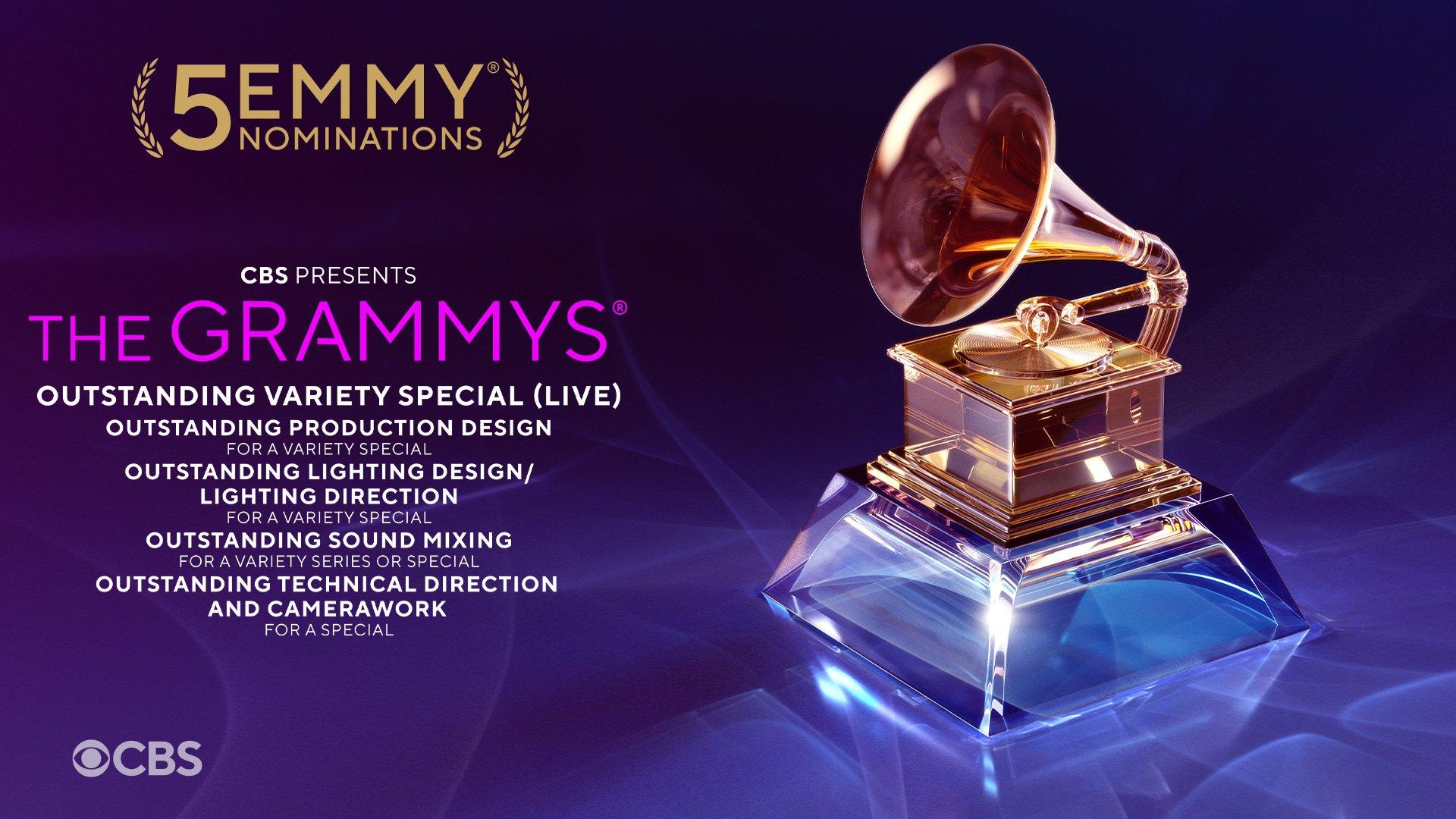
Graphic Courtesy of CBS
news
The 2024 GRAMMYs Have Been Nominated For 5 Emmys: See Which Categories
The 2024 GRAMMYs telecast is nominated for Outstanding Variety Special (Live), Outstanding Production Design For A Variety Special, and three more awards at the 2024 Emmys, which take place Sunday, Sept. 15.
It’s officially awards season! Today, the nominees for the 2024 Emmys dropped — and, happily, the 2024 GRAMMYs telecast received a whopping five nominations.
At the 2024 Emmys, the 2024 GRAMMYs telecast is currently nominated for Outstanding Variety Special (Live), Outstanding Production Design for a Variety Special, Outstanding Lighting Design/Lighting Direction for a Variety Special, Outstanding Sound Mixing for a Variety Series or Special, and Outstanding Technical Direction and Camerawork for a Special.
Across these categories, this puts Music’s Biggest Night in a friendly head-to-head with other prestigious awards shows and live variety specials, including the Super Bowl LVIII Halftime Show starring Usher as well as fellow awards shows the Oscars and the Tonys.
2024 was a banner year for the GRAMMYs. Music heroes returned to the spotlight; across Categories, so many new stars were minted. New GRAMMY Categories received their inaugural winners: Best African Music Performance, Best Alternative Jazz Album and Best Pop Dance Recording. Culture-shaking performances and acceptance speeches went down. Those we lost received a loving farewell via the In Memoriam segment.
The 2025 GRAMMYs will take place Sunday, Feb. 2, live at Crypto.com Arena in Los Angeles and will broadcast live on the CBS Television Network and stream live and on demand on Paramount+. Nominations for the 2025 GRAMMYs will be announced Friday, Nov. 8, 2024.
For more information about the 2025 GRAMMY Awards season, learn more about the annual GRAMMY Awards process, read our FAQ (Frequently Asked Questions) section, view the official GRAMMY Awards Rules and Guidelines, and visit the GRAMMY Award Update Center for a list of real-time changes to the GRAMMY Awards process.
2025 GRAMMYs: Meet The Nominees
2025 GRAMMYs: See The OFFICIAL Full Nominations List
Watch The 2025 GRAMMY Nominations Announcement Now
2025 GRAMMYs Nominations: Album Of The Year Nominees
2025 GRAMMYs Nominations: Song Of The Year Nominees
2025 GRAMMYs Nominations: Best New Artist Nominees
2025 GRAMMYs Nominations: Record Of The Year Nominees
2025 GRAMMYs Nominations: Producer Of The Year Nominees
2025 GRAMMYs Nominations: Songwriter Of The Year Nominees
2025 GRAMMY Nominations: See Shaboozey, Anitta, Teddy Swims & More Artists' Reactions
Beyoncé & Taylor Swift Break More GRAMMY Records, Legacy Acts Celebrate Nods & Lots Of Firsts From The 2025 GRAMMY Nominations
2025 GRAMMYs Nominations: Best African Music Performance Nominees
Who Are The Top GRAMMY Awards Winners Of All Time? Who Has The Most GRAMMYs?
How Much Is A GRAMMY Worth? 7 Facts To Know About The GRAMMY Award Trophy
The Impact Of A GRAMMY Win: Life After The Award
2025 GRAMMYs To Take Place Sunday, Feb. 2, Live In Los Angeles; GRAMMY Awards Nominations To Be Announced Friday, Nov. 8, 2024
GRAMMY Awards Updates For The 2025 GRAMMYs: Here's Everything You Need To Know About GRAMMY Awards Categories Changes & Eligibility Guidelines
Recording Academy Renames Best Song For Social Change Award In Honor Of Harry Belafonte
The Recording Academy Adds More Than 3,000 Women GRAMMY Voters Since 2019, Surpassing Its 2025 Membership Goal

Photo: Jathan Campbell
list
How Much Is A GRAMMY Worth? 7 Facts To Know About The GRAMMY Award Trophy
Here are seven facts to know about the actual cost and worth of a GRAMMY trophy, presented once a year by the Recording Academy at the GRAMMY Awards.
Since 1959, the GRAMMY Award has been music’s most coveted honor. Each year at the annual GRAMMY Awards, GRAMMY-winning and -nominated artists are recognized for their musical excellence by their peers. Their lives are forever changed — so are their career trajectories. And when you have questions about the GRAMMYs, we have answers.
Here are seven facts to know about the value of the GRAMMY trophy.
How Much Does A GRAMMY Trophy Cost To Make?
The cost to produce a GRAMMY Award trophy, including labor and materials, is nearly $800. Bob Graves, who cast the original GRAMMY mold inside his garage in 1958, passed on his legacy to John Billings, his neighbor, in 1983. Billings, also known as "The GRAMMY Man," designed the current model in use, which debuted in 1991.
How Long Does It Take To Make A GRAMMY Trophy?
Billings and his crew work on making GRAMMY trophies throughout the year. Each GRAMMY is handmade, and each GRAMMY Award trophy takes 15 hours to produce.
Where Are The GRAMMY Trophies Made?
While Los Angeles is the headquarters of the Recording Academy and the GRAMMYs, and regularly the home of the annual GRAMMY Awards, GRAMMY trophies are produced at Billings Artworks in Ridgway, Colorado, about 800 miles away from L.A.
Is The GRAMMY Award Made Of Real Gold?
GRAMMY Awards are made of a trademarked alloy called "Grammium" — a secret zinc alloy — and are plated with 24-karat gold.
How Many GRAMMY Trophies Are Made Per Year?
Approximately 600-800 GRAMMY Award trophies are produced per year. This includes both GRAMMY Awards and Latin GRAMMY Awards for the two Academies; the number of GRAMMYs manufactured each year always depends on the number of winners and Categories we award across both award shows.
Fun fact: The two GRAMMY trophies have different-colored bases. The GRAMMY Award has a black base, while the Latin GRAMMY Award has a burgundy base.
Photos: Gabriel Bouys/AFP via Getty Images; Frederick M. Brown/Getty Images
How Much Does A GRAMMY Weigh?
The GRAMMY trophy weighs approximately 5 pounds. The trophy's height is 9-and-a-half inches. The trophy's width is nearly 6 inches by 6 inches.
What Is The True Value Of A GRAMMY?
Winning a GRAMMY, and even just being nominated for a GRAMMY, has an immeasurable positive impact on the nominated and winning artists. It opens up new career avenues, builds global awareness of artists, and ultimately solidifies a creator’s place in history. Since the GRAMMY Award is the only peer-voted award in music, this means artists are recognized, awarded and celebrated by those in their fields and industries, ultimately making the value of a GRAMMY truly priceless and immeasurable.
In an interview featured in the 2024 GRAMMYs program book, two-time GRAMMY winner Lauren Daigle spoke of the value and impact of a GRAMMY Award. "Time has passed since I got my [first] GRAMMYs, but the rooms that I am now able to sit in, with some of the most incredible writers, producers and performers on the planet, is truly the greatest gift of all."
"Once you have that credential, it's a different certification. It definitely holds weight," two-time GRAMMY winner Tariq "Black Thought" Trotter of the Roots added. "It's a huge stamp as far as branding, businesswise, achievement-wise and in every regard. What the GRAMMY means to people, fans and artists is ever-evolving."
As Billboard explains, artists will often see significant boosts in album sales and streaming numbers after winning a GRAMMY or performing on the GRAMMY stage. This is known as the "GRAMMY Effect," an industry phenomenon in which a GRAMMY accolade directly influences the music biz and the wider popular culture.
For new artists in particular, the "GRAMMY Effect" has immensely helped rising creators reach new professional heights. Samara Joy, who won the GRAMMY for Best New Artist at the 2023 GRAMMYs, saw a 989% boost in sales and a 670% increase in on-demand streams for her album Linger Awhile, which won the GRAMMY for Best Jazz Vocal Album that same night. H.E.R., a former Best New Artist nominee, saw a massive 6,771% increase in song sales for her hit “I Can’t Breathe” on the day it won the GRAMMY for Song Of The Year at the 2021 GRAMMYs, compared to the day before, Rolling Stone reports.
Throughout the decades, past Best New Artist winners have continued to dominate the music industry and charts since taking home the GRAMMY gold — and continue to do so to this day. Recently, Best New Artist winners dominated the music industry and charts in 2023: Billie Eilish (2020 winner) sold 2 million equivalent album units, Olivia Rodrigo (2022 winner) sold 2.1 million equivalent album units, and Adele (2009 winner) sold 1.3 million equivalent album units. Elsewhere, past Best New Artist winners have gone on to star in major Hollywood blockbusters (Dua Lipa); headline arena tours and sign major brand deals (Megan Thee Stallion); become LGBTIA+ icons (Sam Smith); and reach multiplatinum status (John Legend).
Most recently, several winners, nominees and performers at the 2024 GRAMMYs saw significant bumps in U.S. streams and sales: Tracy Chapman's classic, GRAMMY-winning single "Fast Car," which she performed alongside Luke Combs, returned to the Billboard Hot 100 chart for the first time since 1988, when the song was originally released, according to Billboard. Fellow icon Joni Mitchell saw her ‘60s classic “Both Sides, Now,” hit the top 10 on the Digital Song Sales chart, Billboard reports.
In addition to financial gains, artists also experience significant professional wins as a result of their GRAMMY accolades. For instance, after she won the GRAMMY for Best Reggae Album for Rapture at the 2020 GRAMMYs, Koffee signed a U.S. record deal; after his first GRAMMYs in 2014, Kendrick Lamar saw a 349% increase in his Instagram following, Billboard reports.
Visit our interactive GRAMMY Awards Journey page to learn more about the GRAMMY Awards and the voting process behind the annual ceremony.
